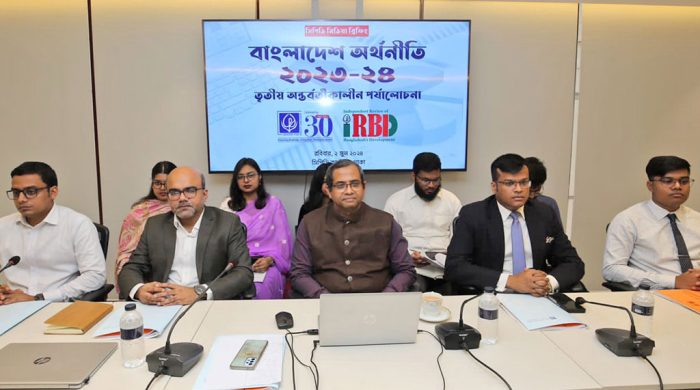Govt fails to check high inflation

- Update Time : Monday, June 3, 2024
- 21 Time View

The Center for Policy Dialogue on Sunday said that the government had failed to tackle the inflation due to weak market monitoring causing price hike of coarse rice by 30 per cent in the past three years.
It also said that the unnecessary expenditure, such as procurement of cars for deputy commissioners and upazila nirbahi officers, and frequent foreign tours by public officials and representatives, undermined the government policy of austerity steps in the outgoing FY24.
It wanted checking revenue leakages as well as hundi, hawla and capital flight without which the shortage of dollars could not be met up only with the availability of $4.7 billion in loan from the International Monetary Fund by May 2026.
The CPD observations came as the local think tank released a report titled ‘State of the Bangladesh economy in FY2023–24: third reading’ in the capital, three days ahead of the announcement of the national budget on June 6.
The analytical presentation by CPD research director Khondaker Golam Moazzem was not only limited on how the outgoing FY24 was, but also focused on the expectations and challenges in FY25.
The CPD research director noted that inflation in Bangladesh was higher than Sri Lanka although the islanders were reeling with around 50 per cent inflation during its debt crisis in 2022.
The headline inflation in Sri Lanka decelerated to 0.9 per cent in May 2024 from 1.5 per cent in April 2024.
Blaming monitoring lapses for the decade-high inflation at more than 9 per cent for the past 23 months in Bangladesh, the CPD analysis on 34 essential food items in Dhaka from January 1, 2019 to May 19, 2024 showed that the prices of three common types of rice in Dhaka had been consistently higher than that in Thailand and Vietnam.
The price hike of coarse rise was around 30 per cent, said Golam Moazzem, adding that greedy traders hiked the price of most common rice consumed by poor people for maximising profits.
Beef prices in Bangladesh were much higher than the global prices, while the price hike of sugar was around 152 per cent.
‘The essential food items have become luxury items,’ he said.
Observing that the private investment and foreign direct investment were decreasing in the outgoing FY24, the CPD said that the growing payment for interest on foreign loan was another big challenge for the government amid low growth. The global demand for apparel and other goods was low, said Golam Moazzem, referring to the paltry export growth in FY24 despite depreciation of local currency by around 36 per cent in the past 23 month.
Besides, hundi had been diverting the inflow of dollars from the country to elsewhere, said the CPD research director, referring to the number of overseas jobholders at 28 lakh, including 17 lakh in the Kingdom of Saudi Arabia.
The inflow of remittance was not increasing, he said, adding that the dollar shortage would continue to disrupt economic indicators like exchange rate, forex reserves and imports.
The CPD said that checking inflation was imperative for higher revenue mobilisation and allocating more spending for education and health, two most important sectors for the country’s coming graduation in 2026.
It also said that the government should give impetus on restoring macro-economic stability by fiscal measures in FY25, aligning with the contractionary monetary policy.
Moreover, the think tank found the government proposed power policy for 2041 aiming at production of 98,000 megawatt as highly ambitious.
By that time, the requirement will be not more than 27,000MW, said the CPD, attributing to several factors, including COVID-19 pandemic and structural break for overestimated future energy demand.
The overestimations suggested that an inflated need for power could lead to substantial and potentially unnecessary investments in infrastructure development, particularly for fossil-fuel-based energy generation, transmission and distribution.
Such investments not only strained financial resources but also posed a significant barrier to the country’s transition towards sustainable energy solutions, said the CPD, calling for further reviews of the proposed power policy.















